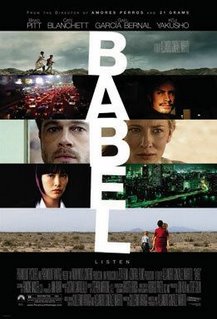
Babel is a film about poor communications. Right from the start, it’s like the yoghurt pots aren’t very close to people’s ears and the string hasn’t been thoroughly enough wet.
Like jigsaw pieces tumbling out of the box, this film throws up images of a number of connected parties in different places, building the tension as the film flicks between Morocco, Mexico and Japan, sometimes revealing the plot out of time sequence. (I’m told it’s a little like Crash—but I haven’t seen it!)
Despite missing the first ten minutes of the film due to my own stupidity, the massive two and a half hours of the film that remained were enjoyable, even if I did have to concentrate to connect together the fragments of action into a coherent narrative. (If you’ve sat through the film and you’re still confused, check out the excellent linear plot summary on Wikipedia.)
- A couple are on holiday in Morocco, on a bus trip, and not making a lot of contact: physically or emotionally. One of them being shot through the bus window doesn’t help their communication either!
- A nanny trapped at home in the US with two children and unable to leave them to go to her son’s wedding in Mexico. The father hangs up when she insists the wedding is important. So she takes them with her, isolating them from their home where their parents expect them (and her) to remain.
- Players on a deaf-mute volleyball team, sign to referee, and make video calls on their mobiles to chat. Chieko, one of the young players, finds it hard to relate to boys without being taken for a freak.
- A man (even as rugged as Brad Pitt) trying to save his wife’s life (as beautiful as Cate Blanchett) isn’t appreciated by the other tourists who are complaining that the bus is too hot and they want to get out of town.
- A nanny abandoned in the middle of scrubland in the middle of the night tries to find help, gets arrested and ha to convince the authorities to go back for the children.
- The story is told in four languages—Arabic, English, Japanese and Spanish—with few characters speaking more than one.
The film portrays a selfish world (particularly the American characters). It’s full of contrasts: the noise of a raucous Mexican wedding switching to the stony silence of a deaf girl in a night club. Lots of people talking, very few listening or understanding. There’s a lack of empathy that makes people callous. And as the characters get broken up into smaller and smaller groups, they become more and more lost, and more and more out of contact with their families. Their lack of communication, their lack of ability to communicate, their babel-ness, brings with it death, the ultimate isolation.
The Sunday Observer reviewer Philip French finished his piece with the paragraph:
I fall into the category that enjoyed the form, 24-out-of-sequence snippets to be pieced together, but was disappointed by the tale it told. But worth the price of a cinema ticket if you can make it to a showing this week at Yorkgate, Lisburn Omniplex or Storm at Odyssey."The global village depicted in Babel is a harsh, unfair place. Tourism and mass media have done little to improve mutual respect and understanding. The film does not state this directly, but it dramatises it in a powerful and moving fashion. The task of re-creating that human unity God destroyed when the Tower of Babel was being built is probably too great, or has been too long neglected. Some will think this film glib and overly schematic. I found it an impressive, beautifully acted work with a tragic sense of life. The formality of its structure controls a seething anger."
1 comment:
I just saw the movie and liked it, but not as much as Crash - which was of a very similar genre but did a better job at plot and dialogue, I thought. I also thought that the director was extremely self-indulgent with some of the scenes set to music, and was not clear about the exact message we were to take away (which definitely makes for a lot to think about, but shows a lack of discipline)... My vote for the Oscar is The Departed...
Post a Comment